Peony in Love Read online
Page 3
Later, lying in bed, I found myself filled with a longing so deep I could barely breathe.
Bamboo-and-Lacquer Cage
MY GRANDMOTHER WAS VERY MUCH ON MY MIND THE next morning. I felt torn between the desire to meet my stranger again tonight and the lessons that had been drilled into me since childhood about how I should behave. I dressed and set out for the ancestral hall. It was a long walk, but I took in everything as though I hadn’t seen it all ten thousand times before. The Chen Family Villa had great halls, vast courtyards, and lovely pavilions that spread down to the shore of West Lake. The wild ruggedness of our rockeries reminded me of what was enduring and strong in life. I saw the expansiveness of lakes and meandering rivers in our artificial ponds and streams. I experienced forests in our carefully planted stands of bamboo. I passed our Gathering-Beauty Pavilion, an upstairs viewing perch that allowed the unmarried girls in our household to watch for visitors in the garden without being detected. From there, I’d heard sounds from the outside world, the trill of a flute floating across the lake, pushed across the water, and insidiously sneaking over our garden wall and onto our property. I’d even heard outside voices: a vendor calling out cooking utensils for sale, an argument between boatmen, the soft laughter of women on a pleasure boat. But I had not seen them.
I entered the hall where we kept my family’s ancestor tablets. The tablets—slips of wood inscribed with the names of my ancestors written in gilded characters—hung on the walls. Here were my grandparents, great-uncles and great-aunts, and countless cousins, many times removed, who had been born, lived, and died in the Chen Family Villa. At death, their souls had separated into three parts and gone to new homes in the afterworld, the grave, and their ancestor tablets. Looking at the tablets, I could not only trace my family back more than nine generations, I could prevail upon the bit of soul that resided in each one to help me.
I lit incense, knelt on a pillow, and looked up at the two large ancestor portrait scrolls that hung on the wall above the altar table. On the left was my grandfather, an imperial scholar who had brought great dignity, security, and wealth to our family. In the painting, he sat in his robes, his legs spread, a fan open in one hand. His face was stern, and the skin around his eyes was wrinkled from wisdom and worry. He died when I was four, and my memory of him was of a man who preferred silence from me and had little tolerance for my mother or for the other women in our household.
To the right of the altar table in another long scroll was my father’s mother. She also wore a severe expression. She had a position of great honor, in our family and in the country, as a martyr who’d died in the Cataclysm. In the years leading up to her sacrifice, my grandfather had served as the Minister of Works in Yangzhou. My grandmother left the Chen Family Villa here in Hangzhou and traveled two days by boat and by palanquin to live with him in Yangzhou. Not realizing disaster was coming, my parents went to Yangzhou for a visit. Soon after they arrived, the Manchu marauders invaded.
Whenever I tried to talk to Mama about that period, she would say, “You don’t need to know about it.” Once, as a five-year-old, I’d been impudent enough to ask if she’d seen Grandmother Chen die. Mama slapped me so hard I fell to the ground. “Don’t ever speak to me about that day.” She never hit me again, not even during my footbinding, and I never again asked her about my grandmother.
Others, however, invoked her almost daily. The highest goal a woman could achieve in life was to be a chaste widow who would not accept a second marriage, not even if it meant taking her own life. But my grandmother had done something even more extraordinary. She elected to kill herself rather than give herself to the Manchu soldiers. She was such an exemplary example of Confucian chastity that, once the Manchus established the Qing court, they selected her to be venerated in stories and books for women to read, if they hoped to reach perfection themselves as wives and mothers, and to promote the universal ideals of loyalty and filial piety. The Manchus were still our enemy, but they used my grandmother, and the other women who had sacrificed themselves during the disaster, to win our respect and bring back order to the women’s chambers.
I placed offerings of flawless white peaches on her altar.
“Do I meet him or not?” I whispered, hoping she would guide me. “Help me, Grandmother, help me.” I dropped my forehead to the floor in obeisance, looked up at the portrait to let her see my sincerity, and dropped my head again. I rose, smoothed my skirt, and left the room, my wishes floating to my grandmother on trails of incense smoke. But I felt no surer of what I should do than when I’d entered.
Willow waited for me outside the door.
“Your mother says you’re late for breakfast in the Spring Pavilion,” she said. “Give me your arm, Little Miss, and I will take you there.”
She was my servant, but I was the one who obeyed.
By now the corridors bustled with activity. The Chen Family Villa was home to 940 fingers: 210 fingers belonged to my direct blood relatives, 330 fingers to the concubines and their children—all girls—and another 400 fingers to our cooks, gardeners, wet nurses, amahs, maids, and the like. Now, with the Double Seven festival, we had many more visiting fingers. With so many people in the household, our compound was designed to keep each of those fingers in its appropriate place. So this morning, as every morning, our household’s ten concubines—and their twenty-three daughters—ate in their own hall. Three cousins, who were at critical points in their footbinding, were confined to their rooms. Otherwise, the women in the Spring Pavilion sat according to rank. My mother, as the wife of the eldest brother, had the position of honor in the room. She and her four sisters-in-law sat at one table, five little cousins sat at another table with their amahs, while the three cousins my age and I had a table to ourselves. Our guests were also grouped by age and station. In the corner, amahs and wet nurses cared for the babies and girls under five years old.
I swayed with a flawless lily gait, moving gently across the floor, careful with my steps, my body shivering from side to side like a flower in the breeze. When I sat down, my cousins didn’t acknowledge me, conspicuously leaving me out. Ordinarily I didn’t mind too much. I was already engaged to be married, I would tell myself, and had only five more months of their company. But after my encounter in the Riding-the-Wind Pavilion last night, I questioned what lay ahead of me.
My father and my future husband’s father had been boyhood friends. When they were matched to their wives, they vowed that one day the two families would be united through their children. The Wu family had two sons right away, I took longer to arrive, and before long my Eight Characters were matched to the younger son. My parents were happy, but it was hard for me to be excited, especially now. I had never met Wu Ren. I didn’t know if he was two years or ten years older than I was. He could be pockmarked, short, cruel, and fat, but I would receive no warnings from my mother or father. Marriage to a stranger was my fate, and it wasn’t necessarily a happy one.
“Today the jade maiden wears the color of jade,” Broom, the daughter of my father’s second brother, said to me. She had a flower name like the rest of us, but no one used it. She had the misfortune of having been born on an unlucky day when the Broom Star was most prominent, which meant that whatever family she married into would have its home swept of its luck. Second Aunt was softhearted, and as a result Broom already had the roundness of a woman past childbearing years. The other aunts, my mother included, all campaigned to keep her from eating too much, hoping that once she married out her bad luck would be removed from our compound.
“I don’t know that this color is good for your skin,” Lotus, Third Aunt’s eldest daughter, added sweetly. “I’m sure this is a sorry thing for our jade maiden to hear.”
I kept a smile on my face, but their words hurt. My father always said I was a jade maiden and my future husband was a golden boy, which implied that the families were of comparable wealth and status. I shouldn’t have, but I found myself wondering about the young man I’d met l
ast night and if my father would have found him satisfactory.
“But then,” Lotus went on sympathetically, “I hear the golden boy is a bit tarnished. Is this not so, Peony?”
Whenever she said things like this, I fought back, and I had to do it now or appear weak. I pushed my stranger from my mind.
“If my husband had been born in a different time, he would have become an imperial scholar like his father, but this is not a good course to sail these days. Still, Baba says Ren was precocious from the time he was a boy,” I boasted, trying to sound convincing. “He will make a wonderful husband.”
“Our cousin should hope for a strong husband,” Broom confided to Lotus. “Her father-in-law is dead and the Wu boy is only a second son, so her mother-in-law will have great power over her.”
This was too mean.
“My husband’s father died in the Cataclysm,” I objected. “My mother-in-law has been an honorable widow.”
I waited for what the girls would say next, since they seemed very informed. With the Wu patriarch dead, had the family fallen on hard times? My father had provided a sizable dowry for me that included fields, silk-weaving enterprises, stock animals, and more than the usual amount of cash, silk, and food, but a marriage where the wife had too much money was never happy. Too often the husbands became henpecked and the subject of much banter, while the wives were known for their cruel ways, biting tongues, and heartless jealousy. Was this the future my father intended for me? Why couldn’t I fall in love like Liniang?
“Just don’t go braying to the heavens about your perfect match,” Broom concluded smugly, “when the whole compound knows otherwise.”
I sighed. “Please, have another dumpling,” I said, pushing the platter toward her.
Broom sneaked a peek toward the mothers’ table and then with her chopsticks lifted a dumpling and popped it whole into her mouth. My other two cousins stared at me with evil in their eyes, but I couldn’t do much about it. They embroidered together, ate lunch together, and talked behind my back together. But I had little ways of fighting back, even if they were petty. I was known to do wicked things, like show off my pretty clothes, hairpins, and jewelry. I was immature, but I only acted mischievously to protect myself and my feelings. I didn’t understand that my cousins and I were trapped like good-luck crickets in bamboo-and-lacquer cages.
I spent the rest of breakfast in silence, with the others ignoring me with all the conviction that only unmarried girls can muster and with me believing I was immune to their wicked thoughts. But of course I wasn’t, and I was suddenly overcome by my inadequacies. In some ways I was even more of a disappointment than Broom. I was born in the seventh month four years after the Cataclysm, when all four weeks are set aside for the Festival of Hungry Ghosts—not a propitious time. I was a girl, a calamity for any family but particularly for one like ours, which had sustained great losses during the Cataclysm. As the eldest brother, my father was expected to have a son who one day would become the head of our family, perform rites in the ancestral hall, and make offerings to our long-dead relatives so they would continue to bring us good luck and fortune; instead, he was burdened by a single useless daughter. Maybe my cousins were right and he’d matched me to someone insignificant as punishment.
I looked across the table and saw Broom whisper in Lotus’s ear. They glanced at me and then covered their mouths to hide their smirks. Instantly my doubts evaporated, and I inwardly thanked my cousins. I had a secret so big they would fly apart from jealousy and envy if they knew.
After breakfast, we moved to the Lotus-Blooming Hall, where my mother announced a zither contest for the unmarried girls. When my turn came, I sat on the raised dais in front of the group just as the others had done, but I was a terrible zither player and I kept losing my fingers on the strings as I thought of the young man I’d met last night. As soon as I finished, my mother dismissed me, suggesting I take a stroll in the garden.
Released from the women’s chambers! I hurried along the corridor to my father’s library. Baba was the Chen family’s ninth generation of imperial scholars of the jinshi level, the highest attainable. He had been a Vice Commissioner of Silk during Ming times, but with the chaos—and disen-chanted with the thought of serving the new emperor—he’d come home. He’d taken up gentlemanly pursuits: writing poetry, playing chess, tasting tea, burning incense, and now producing and directing operas. In many ways, he—like so many men these days—had adopted our women’s philosophy of turning inward. Nothing made him happier than to unroll a scroll while being enveloped in a cloud of incense or sip tea while playing a game of chess with his favorite concubine.
Baba was still a Ming loyalist, yet he was bound by the rules of humanity; he refused to work in the new government, but he still had to shave his forehead and wear a queue to show his subservience to the Qing emperor. He explained his capitulation this way: “Men are not like women. We go into the outer realm where we are seen. I had to do as the Manchus ordered or risk decapitation. If I had died, how would our family, our home, our land, and all the people who work for us have survived? We’ve suffered so much already.”
I stepped into my father’s library. A servant stood by the door, ready to attend to Baba’s needs. On the walls to my left and right were marble “paintings”—slices of marble that revealed hidden landscapes of cloud-covered mountains against a murky sky. The room, even with the windows open, was redolent of the four jewels of the scholar’s study: paper, ink, brushes, and the earthiness of the inkstone. Nine generations of scholars had built this library, and printed books were everywhere—on the desk, the floor, the shelves. My father had added his mark to the collection by amassing hundreds of works written by women during the Ming dynasty and well over a thousand books written by women since the Cataclysm. He said that these days men had to find talent in unusual places.
This morning Baba was not at his desk. Instead, he lounged on a wooden bed with a rattan bottom, watching mist rise off the lake. Beneath the bed I saw twin trays, each with large blocks of ice on them. He indulged his sensitivity to heat by having our servants dig up preserved ice from underground and use it to cool his daybed. On the wall above him hung a couplet, which read:
Do not care about fame. Be modest.
In this way you will be found by others to be special.
“Peony,” he said, and waved me over to him. “Come and sit.”
I crossed the room, swinging close to the windows so I could look out over the lake to Solitary Island and beyond. I wasn’t supposed to see outside our walls, but today my father wordlessly permitted me this treat. I sat down in one of the chairs that had been placed before his desk for those who came to ask favors.
“Have you come to escape your teacher again today?” he asked.
Over the years, my family had provided me with wonderful teachers—all women—but from the time I was four, my father had let me sit in his lap so he could personally teach me to read, understand, and criticize. He taught me that life imitates art. Through reading, he told me, I could enter worlds different from my own. In picking up the brush to write, I could exercise my intellect and imagination. I considered him my best teacher.
“I have no lessons today,” I reminded him shyly.
Had he forgotten my birthday was tomorrow? Usually birthdays were not celebrated until someone reached the age of fifty, but hadn’t he mounted the opera for me because he loved me and I was precious to him?
He smiled indulgently. “Of course, of course.” Then he turned serious. “Too much female gossip in the women’s chambers?”
I shook my head.
“Then you have come to tell me that you won one of those contests your mother has organized.”
“Oh, Ba.” I sighed in resignation. He knew I didn’t excel at those things.
“You are so old now I can’t even tease you anymore.” He slapped his thigh and laughed. “Sixteen tomorrow. Have you failed to remember this special day?”
I smiled b
ack at him. “You’ve given me the best present.”
He cocked his head in question. He had to be teasing me again and I played along.
“I suppose you staged the opera for someone else,” I suggested.
Baba had encouraged my impertinence over the years, but today he didn’t respond with something swift and clever. Instead, he said, “Yes, yes, yes,” as if with each word he considered his answer anew. “Of course. That was it.”
He pulled himself up and threw his legs over the side of the bed. After he stood, he took a moment to adjust his clothes, which were modeled on Manchu riding gear—trousers and a fitted tunic that buttoned at the neck. “But I have another present for you. One I think you’ll like even more.”
He went to a camphor-wood chest, opened it, and pulled out something wrapped in purple silk woven in a pattern of willows. When he handed it to me, I knew it was a book. I hoped it was the volume of The Peony Pavilion that the great author Tang Xianzu had published himself. I slowly untied and then unfolded the silk. It was an edition of The Peony Pavilion I did not yet have, but not the one I wished for. Still, I clutched it to my chest, relishing how special it was. Without my father’s help, I would not have been able to pursue my passion, no matter how resourceful I was.
“Ba, you’re too good to me.”
“Open it,” he urged.
I loved books. I loved the weight of them in my hands. I loved the smell of the ink and the feel of the rice paper.
“Don’t fold over the edges of the page to mark your place,” my father reminded me. “Don’t scratch at the written characters with your fingernails. Don’t wet your finger with your tongue before turning the pages. And never use a book as a pillow.”

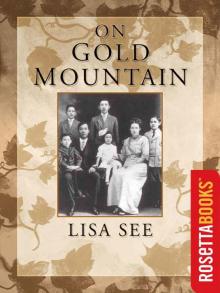 On Gold Mountain: The One-Hundred-Year Odyssey of My Chinese-American Family
On Gold Mountain: The One-Hundred-Year Odyssey of My Chinese-American Family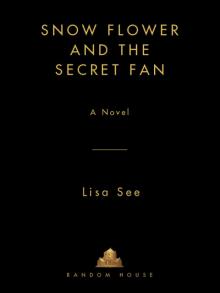 Snow Flower and the Secret Fan
Snow Flower and the Secret Fan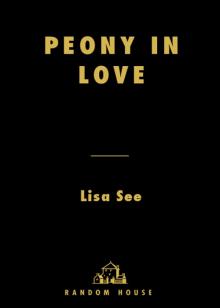 Peony in Love
Peony in Love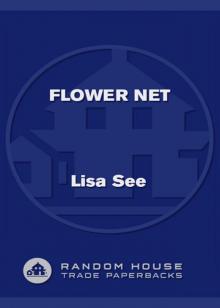 Flower Net
Flower Net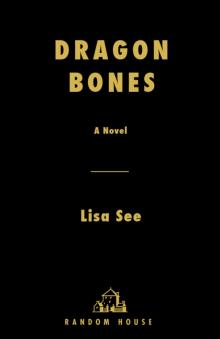 Dragon Bones
Dragon Bones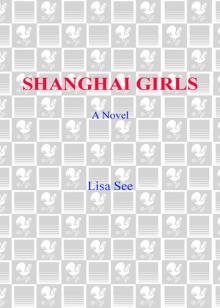 Shanghai Girls
Shanghai Girls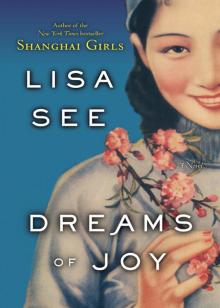 Dreams of Joy
Dreams of Joy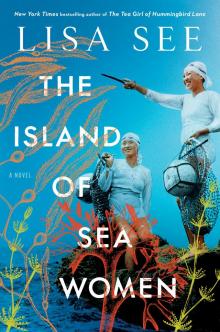 The Island of Sea Women
The Island of Sea Women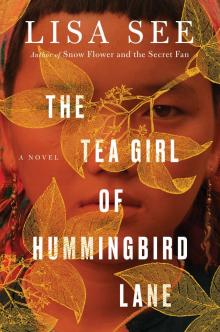 The Tea Girl of Hummingbird Lane
The Tea Girl of Hummingbird Lane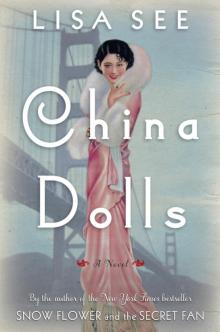 China Dolls
China Dolls The Interior
The Interior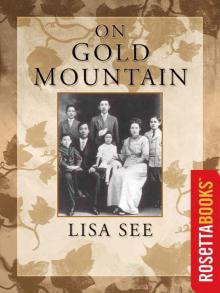 On Gold Mountain
On Gold Mountain